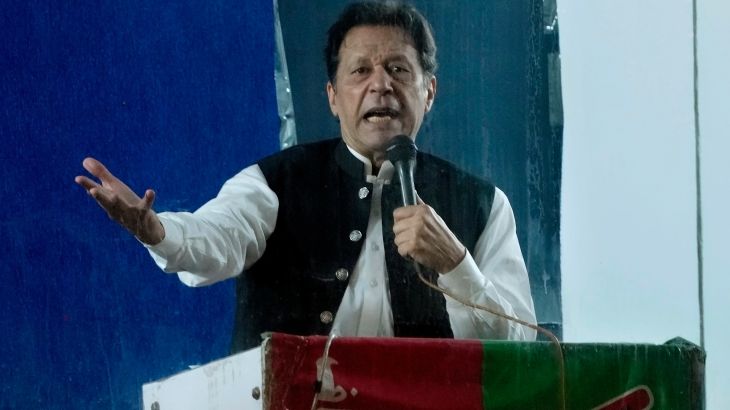Imran Khan arrest: Why was the ex-PM detained? What happens next?
Khan’s arrest in a corruption case led to countrywide protests, army deployment and social media blackout.

Protests and rioting have continued across Pakistan a day after former Prime Minister Imran Khan was dragged from a court in the capital Islamabad to an unknown location and his supporters clashed with police across the country.
The 70-year-old opposition leader was indicted and remanded in custody for eight days in a corruption case on Wednesday after a hearing was held in a court temporarily relocated to a police guest house in Islamabad.
Keep reading
list of 4 itemsPakistan court indicts former PM Imran Khan in state gifts case
Timeline: Imran Khan, from ouster to arrest
Khan’s supporters protest ex-PM’s arrest across Pakistan
Police said more than 1,000 people had been arrested since protests broke out on Tuesday following his arrest.
Khan, who was removed as prime minister last year but remains the country’s most popular opposition figure, is the seventh former prime minister to be arrested in Pakistan.

Why was Khan arrested?
Khan has been charged in more than 100 cases – including corruption, terrorism and blasphemy – since his removal from power through a parliamentary no-confidence vote.
His arrest was made in connection to the Al-Qadir Trust case initiated last year by the government of Prime Minister Shehbaz Sharif.
On Tuesday, the National Accountability Bureau (NAB) said Khan was arrested “for the crime of corruption” connected to the trust. Interior Minister Rana Sanaullah Khan confirmed that the former prime minister, leader of the Pakistan Tehreek-e-Insaf (PTI) party, was arrested in a case pursued by the anti-corruption body.
What is the Al-Qadir Trust case?
Last June, the government alleged that Khan and his wife Bushra Bibi obtained land worth billions of rupees (millions of US dollars) for the Al-Qadir University Trust, headed by the duo, from Malik Riaz – a major property tycoon of Pakistan – to build an educational institute.
NAB has alleged that Khan’s PTI government struck a deal with Riaz in a quid pro quid arrangement, wherein they allegedly helped Riaz launder more than $239m and caused a loss to the national exchequer.
How did Khan’s supporters react to the arrest?
Clashes and rioting broke out in all major cities across the country following Khan’s arrest and resumed on Wednesday as he was presented in court.
PTI supporters took to the streets in the capital Islamabad as well as Karachi, Lahore, Peshawar and other cities. Police said nearly 1,000 people have been arrested in Punjab province.
Rubber bullets being fired towards people of Pakistan in Pindi: #ReleaseImranKhan pic.twitter.com/4MXETTotRX
— PTI (@PTIofficial) May 9, 2023
The government requested that the army be deployed in response to the protests. At least one person was killed in the southwestern city of Quetta on Tuesday, and dozens were wounded in various parts of the country.
Authorities restricted access to Twitter, Facebook and other social media platforms as well as mobile broadband.
“Total internet shutdowns have been observed in some regions,” NetBlocks, the global internet monitor, said on Tuesday.
🇵🇰Pakistan: Amid concerns about escalating clashes between Imran Khan’s supporters and the police, Amnesty International is alarmed by reports that Pakistani authorities have suspended mobile internet and access to Twitter, Facebook and YouTube.
— Amnesty International South Asia, Regional Office (@amnestysasia) May 9, 2023
Khan vs the army
The former PM’s political demise was rooted in twin realities.
Inside parliament, Khan’s party had lost the support of coalition allies, denying him the majority he needed to defeat the vote of no confidence. Outside, he appeared to lose the support of Pakistan’s powerful military, which the opposition alleged helped him win the 2018 general election, and had recently publicly fallen out with the former prime minister over senior military appointments and policy decisions.
The dispute has continued, with Khan calling on the country’s president to investigate the military for an attack on him last year.
Before setting off for his hearing, Khan addressed the military’s information wing and condemned them for accusing him of bringing the military into disrepute. Shortly afterwards, he was arrested.
On Wednesday, the army said that May 9 – the day protests erupted after Khan was arrested – “will be remembered as a dark chapter” in the country’s history.
[English Subtitles] Chairman Imran Khan's response to ISPR Press Release!
His life is in danger, but he is ready to go to any lengths for Pakistanis. We are blessed to be living in his era! May Allah protect him against all evils.#BehindYouSkipper #SubtitledByPTI pic.twitter.com/SlNH0YVivs
— PTI (@PTIofficial) May 9, 2023
What’s next?
Imran Shafique, a lawyer and former prosecutor at NAB, said that according to the regulations of NAB, Khan can be kept under custody for a maximum of 14 days.
“The court has ordered an eight-day remand for him [Khan], and it can be extended for another six days,” Shafique told Al Jazeera.
He explained that Khan will be able to seek bail once the duration of his remand is over.
“As per Pakistani law, there are two types of remands – physical and judicial – and Khan is currently being held under physical remand,” he said, adding that once the eight days are over, the former prime minister will be moved to a jail under judicial remand.
“Once he is under judicial remand,” Shafique said, “he can seek bail and the court will decide whether the bail can be granted or not.”